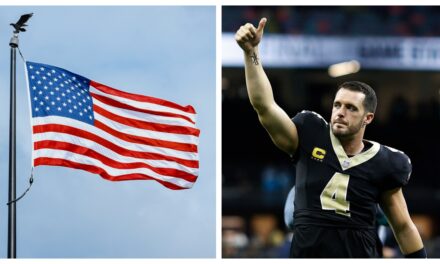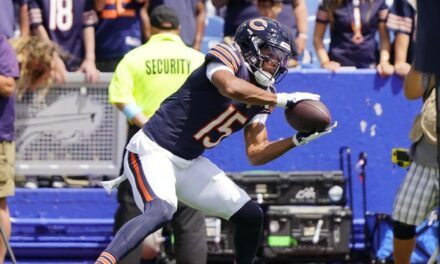We support our Publishers and Content Creators. You can view this story on their website by CLICKING HERE.
Doctors are going to have a significant say in what Miami Dolphins quarterback Tua Tagovailoa is able to do following the concussion that sent him to the injured reserve list. So what does an actual doctor think about Tagovailoa’s situation?
Dr. David Chao, OutKick’s medical expert, is an orthopedist. But as the head team physician for the San Diego Chargers for 17 years, he represented the team in multiple national concussion conferences held by the NFL. He interpreted neurologist evaluations for the Chargers. He was the spokesman for the team in relating the meaning of those evaluations.
“I’m speaking on it from that perspective,” Dr. Chao said Thursday.
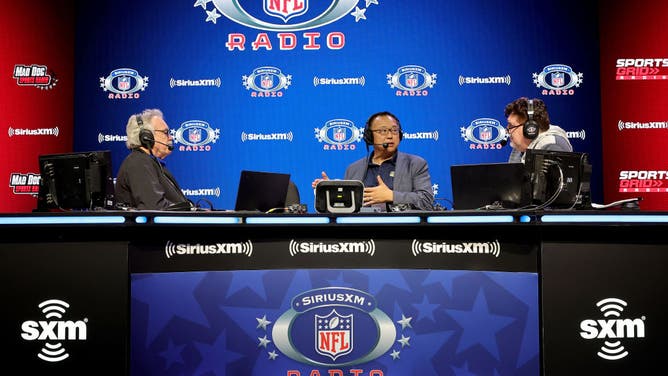
LOS ANGELES, CALIFORNIA – FEBRUARY 09: (L-R) SiriusXM host Pat Kirwan, Dr. David Chao and SiriusXM host Jim Miller speak during an interview on day 1 of SiriusXM at Super Bowl LVI on February 09, 2022 in Los Angeles, California. (Photo by Cindy Ord/Getty Images for SiriusXM)
Dr. Chao On Tagovailoa Situation
“Even if he had five concussions in the last five years, which is what everyone believes going back to two in college, and two diagnosed two years ago, and another this year, the first statement I would make is every concussion is career threatening and serious,” Dr. Chao said.
“But five concussions is not automatically career-ending.”
Mitch Morse, according to Sports Injury Central, has six documented concussions. He’s the starting center for the Jacksonville Jaguars.
“And he’s still playing,” Dr. Chao noted. “And you can argue his risk based on him taking blows on the line is greater than Tua’s. No two concussions are the same. So I’m not saying Mitch Morse’s six are equal to Tua’s five in any way, shape or form.
“Absolute numbers is not what rules it out. I was there when Stan Humphries had his final concussion and I think that was only his third. It wasn’t six. So, numbers absolutely don’t make that big a deal.”
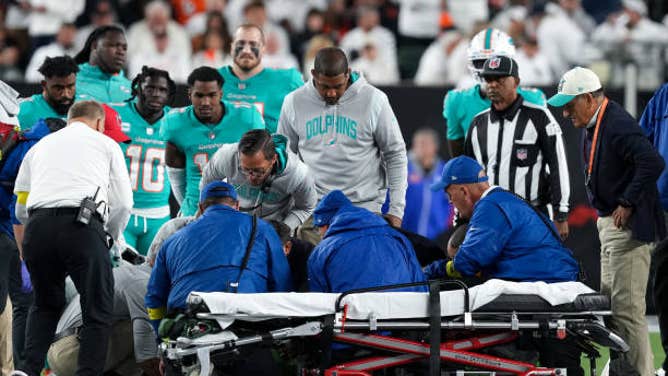
Tua Tagovailoa of the Miami Dolphins is attended to after being injured earlier this season. (Photo by Dylan Buell/Getty Images)
Optics Mean Little With Concussions
The optics of most of Tagovailoa’s concussions are startling because he has exhibited the classic fencing response each time.
“The posturing itself does look scary,” Dr. Chao said. “But in of itself, it does not mean that there’s permanent damage. Certainly, it means his brain was significantly affected in the moment, but it does not necessarily mean he has permanent damage.
“If he shows any signs of permanent or lingering symptoms, he will not be cleared to return. Period. Nobody’s taking that risk.”
Dr. Chao says the primary factor determining whether Tagovailoa gets cleared is timing.
“It’s the lingering symptoms,” Dr. Chao said. “If he has lingering symptoms for weeks or months, he’ll never get cleared. If he clears quickly, then there’s a chance the doctor will say, ‘You have risk, but it’s up to you to determine if that risk is acceptable.'”
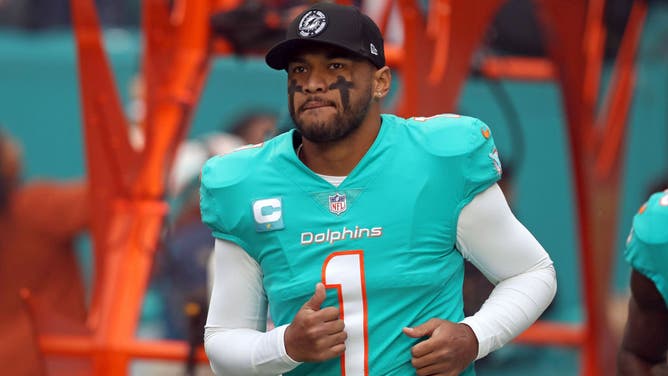
Dolphins quarterback Tua Tagovailoa takes the field for a game against the Green Bay Packers. (John McCall/South Florida Sun Sentinel/Tribune News Service via Getty Images)
Symptom Free Timeline Paramount
Ideally, Dr. Chao says, Tagovailoa is free of symptoms now. Only the player, his family, the doctors treating him, and the team are likely to know that at this stage.
In 2022, when Tagovailoa sustained his second concussion of the season, Chao made this observation:
“Every other quarterback’s next concussion, he’s 50-50 to play the next week and likely to play in two weeks. That’s the pattern for most players. But for Tua, the next concussion he’ll miss a month.”
Tagovailoa didn’t suffer a concussion in 2023, but the observations from 2022 have carried over to this year as the player will miss a minimum of four games.
Tagovailoa is almost definitely seeing multiple doctors beyond the team doctor and the NFL’s local independent neurologist.
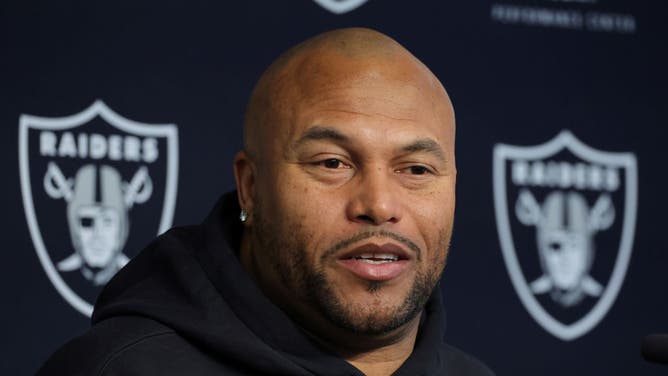
HENDERSON, NEVADA – JUNE 13: Head coach Antonio Pierce of the Las Vegas Raiders attends a news conference during mandatory minicamp at the Las Vegas Raiders Headquarters/Intermountain Healthcare Performance Center on June 13, 2024 in Henderson, Nevada. (Photo by Ethan Miller/Getty Images)
Should Tua Tagovailoa Retire?
Dr. Chao has a message for people advocating that Tagovailoa retire – Raiders coach Antonio Pierce among them.
“If you’re saying he should quit playing football because of long-term head injury risk, I would agree with you,” Dr. Chao said. “But I would say that’s probably true for his 52 teammates as well. Because the next concussion, or a first concussion, has the potential of long-term injury risk.
“There’s no question the safer thing for Tua to do is quit playing football. But that statement might go for his other 52 teammates as well.”
Finally, Dr. Chao addresses the issue of CTE. He was a close friend to Hall of Fame linebacker Junior Seau, who committed suicide and was afterward shown in his autopsy to suffer from CTE.
“Is Tua now guaranteed to have CTE? No,” Dr. Chao said. “Could he have CTE? We don’t know absolutely … If he quit and could be promised he’d never have CTE, I would strongly urge he quit today. But you can’t make that promise, either.”
On to other injuries of note this week:
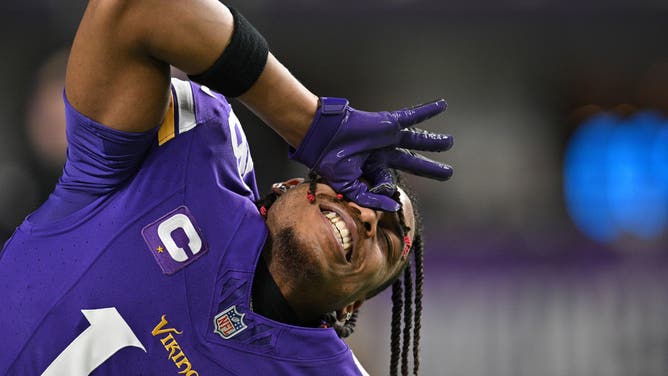
Good News On Justin Jefferson
Justin Jefferson gave Vikings fans a fan with what is being reported as a quadriceps contusion. But Jefferson has remained optimistic he’ll play in the next game against the Houston Texans.
“Not an issue,” Dr. Chao said. “That was a high quad contusion muscle injury. In-game we thought not an issue. We continue to believe not an issue.”
“Now, the only question is, this week, who’s faster: Justin Jefferson or that back judge?”
He’s kidding. But that back judge was flying.
Deebo Not Like McCaffrey
The San Francisco 49ers lost that game to the Vikings last week. And they emerged with multiple injuries.
The most immediately worrisome of those might be wide receiver Deebo Samuel’s calf injury. But although Samuels is likely to miss some time with that calf injury, it is nothing like the Christian McCaffrey calf injury.
“Because Deebo is a calf and not an achilles,” Dr. Chao said. ” And the risk is not worse if [he aggravates] it playing. He sits out of couple of weeks and there is no catastrophic risk.
“That’s where those two injuries are different and why you’re hearing CMC might be longer than the four weeks [on injured reserve].”
McCaffrey has achilles tendonitis and that’s a concern.
“That makes them nervous. Not the calf,” Dr. Chao said. “With the calf, McCaffrey would have rolled with the calf.”
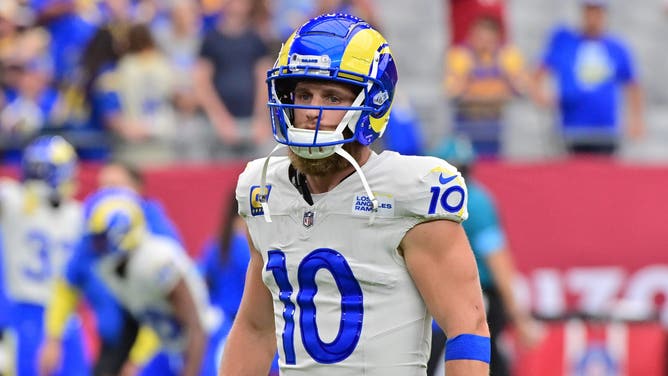
Matt Kartozian-Imagn Images
(Matt Kartozian-Imagn Images)
Cooper Kupp Not High Ankle Sprain
Cooper Kupp is going to miss some time with an ankle sprain but it’s not as bad as the high ankle sprain that was widely reported in media on Thursday.
“That was an eversion ankle sprain which is a form of high ankle sprain,” Dr. Chao said. “But there is a difference between an eversion ankle sprain (where the ankle rolls out) compared to a high ankle sprain (which occurs when the foot is flexed upward and the ankle is twisted.)
“Eversion gives a better recovery timeline. I never thought Cooper Kupp was going on IR. I thought he’d miss one week at most. It’s sort of trending that maybe he misses a couple of weeks.
“I don’t think it’s impossible that he’s back next week,” Dr. Chao added.

 Conservative
Conservative  Search
Search Trending
Trending Current News
Current News 